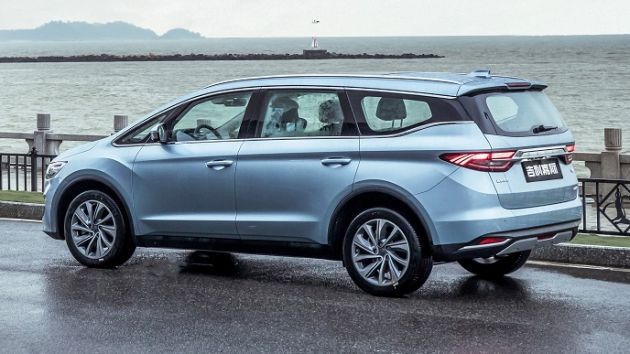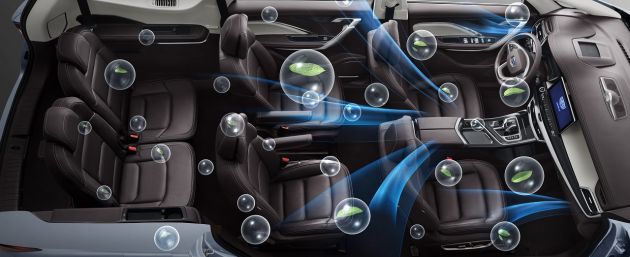It’s been a long time coming, but Geely’s first MPV, the Jiaji, has finally been launched in China. Teased since September last year, the people carrier arrives in the Middle Kingdom in standard petrol, mild hybrid and plug-in hybrid variants, priced from 99,800 yuan (RM60,800) to 182,800 yuan (RM111,400)
The Jiaji is certainly a big car, measuring 4,706 mm long, 1,909 mm wide and 1,690 mm (1,713 mm for the PHEV) tall, with a wheelbase of 2,805 mm. That said, it’s quite a bit shorter than both the Toyota Alphard (4,945 mm) and Kia Grand Carnival (5,115 mm) – both of which have wheelbases around three metres – which should make for a more manageable size on the road.
Geely says that the Jiaji combines “sleekness of sedan, the power of an SUV, and the space of an MPV.” Design-wise, it fits neatly within the company’s latest range, with flowing lines, a concentric “expanding cosmos” grille, a pronounced front fender bulge, a window line kink and a blacked-out D-pillar for that “floating roof” look. It rides tall on its 18-inch two-tone alloy wheels with a ground clearance of 165 mm.
Inside, the car adopts a modern design, with a broad dashboard and a floating centre console enhancing the sense of space. In the middle sits a freestanding 12.3-inch infotainment touchscreen that incorporates the Geely Smart Ecosystem (GKUI), now with a “children” mode that automatically sets the air-conditioning and volume, closes the windows and plays children’s songs for the comfort of the little ones.
The car is offered as either a six- or a seven-seater with 2+2+2, 2+2+3 and 2+3+2 configurations; the second-row captain’s chairs on the first two layouts are capable of reclining up to 165 degrees and come with special “sleep” headrests. Other features include a large panoramic sunroof, active noise cancellation and an AQS air purification system as found in the Boyue SUV (sold here as the Proton X70).
Under the bonnet lies a choice of two engines, starting with the Boyue’s 1.8 litre turbocharged four-cylinder petrol engine – it makes 181 hp and 300 Nm of torque and is paired to a six-speed torque converter automatic transmission. There’s also a 1.5 litre turbo mill that is jointly developed with Volvo, pushing 174 hp and 255 Nm through either a six-speed manual or a seven-speed dual-clutch auto.
Models fitted with the DCT are also available with a 48-volt mild hybrid system that bumps outputs to 188 hp and 300 Nm and delivers a fuel consumption figure of 5.9 litres per 100 km combined. Last but not least is the PHEV version that pairs the 1.5 litre unit with an electric motor to provide a total system output of 255 hp and 385 Nm. This one consumes just 1.6 litres of fuel per 100 km, has a 56 km all-electric range and can be charged in 90 minutes through a fast charging station.
In terms of safety, the Jiaji is offered with Level 2 semi-autonomous driving features such as Intelligent Cruise Control (ICC) and Lane Keep Assistant (LKA). Also available is Automated Park Assist (APA), Autonomous Emergency Braking (AEB) with pedestrian detection, Lane Change Assistant (LCA), Blind Spot Detection (BSD), Speed Limit Identification (SLIF), Rear Collision Warning (RCW) and Rear Cross Traffic Alert (RCTA).
The Jiaji is set to arrive on Malaysian shores in 2020 as a Proton as part of a licensing agreement with the national carmaker, which has since spawned the X70 and which will also result in a B-segment SUV based on the Binyue.
Source: Read Full Article




